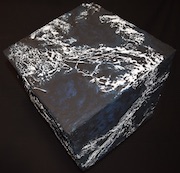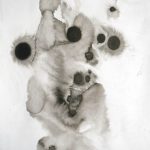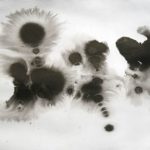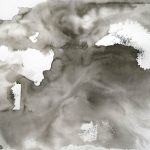Interview by Rafa Dorado on April 2, 1998 for Margen Magazine in Spain.
– Your career is a monument to Musical Art, and cannot be sumarized in a few lines, but what are the essentials of your beginnings?
I tought myself to improvise on the piano when I was about 12-13 years old, but I wanted to make music that took me farther “inside” so I started to build a modular synthesizer from electronic kits when I was about 14. I began playing in bands a few years later, making strange noisy improvised music. My interest in slow music kept growing, and I started playing all night concerts for sleeping audiences when I was about 19 years old (in 1982.) I released my first solo album (Sunyata) with this slow music as an inspiration.
– Tell me about your musical evolution from Sunyata until now.
I am not sure if my music has evolved “upward” like a staircase. Perhaps a better analogy is a tree. As I grow, my interests branch out and take me into new directions, yet my roots are still in the same place. My roots lie in my attraction to the mystery, to the energetic potentials of music. As I learn more about the many approaches to making energized music, I incorporate what I learn into my own style. For example, when I became more interested in microtonality about 15 years ago, I started to examine the way non-western cultures used tuning systems in their music. As a result, I started to incorporate more elements of non-western music into my vocabulary, adding new elements to my personal style. After exploring cyclic music and non-western melodies for a while, I felt like re-exploring some of my beginnings in slow music (combined with some of my newly acquired skills) and thus moved into the “dark ambient” terrain of Stalker, Troubled Resting Place and Below Zero. Each album grows out of my curiosity and desire to explore new ground.
– I think that Amoeba (Watchful) is a turning point in your career. Are you o.k with this opinion? How did you conceive this work?
Amoeba gives me a chance to express a different side of myself. I have always loved really good pop music, especially the most risk-taking and introspective songwriters. Lyrics bring out a different element in music, another layer. The voice makes the music more personal, and it speaks to people in less abstract ways. I have been pushing myself in this direction because this is a territory of music that I love. I still play instrumental music as well, but now I have this new vehicle for musical growth.
Amoeba has been a work-in-progress for almost 20 years. I met Rick Davies (the other half of the band) when I was 15 years old. He grew up in Barcelona, went to university in England, then came to California to work for a synthesizer company in 1979. I was looking for an unusual person to start a band with, and he was interested in making the strange music that I wanted to make. We became best friends, and we have played together in various ways since that time. A few years ago we talked about playing music together again, but in a more serious and focused way. The result was Amoeba and “Watchful,” whose songs reflected a time of personal turmoil in my own life. So far, most people have responded very well to the album, and we have started to record a new one. I know that some people still have a problem with the idea of me singing, because they are used to my instrumental music; but it is a very important process for me to express certain emotions. I want the words to be ambiguous, to be equal with the other instruments, perhaps to trigger some deep feelings.
– In the last years as a solo composer. How have you changed as a writer? What elements have remained? Do you think your actual music is more accesible than your early music or vice versa?
I work differently on different projects. Some of my latest music is probably less accessible than anything I have previously done, but I think it is some of my most interesting work. To be honest, I never really know if my work sounds accessible to other people or not. Some people find even my most melodic work to be difficult, other people think I could go farther and make more harsh music. I just follow what my ear tells me. I try to make albums that I would want to listen to. Perhaps my albums evolve as my tastes evolve.
Have I changed how I work? I don’t know. I think sometimes that I purposely redirect my methods when I find myself repeating an idea. For example, I sometimes become very meticulous when I work on a new album (especially albums like Propagation, Gaudi or the upcoming Seven Veils, which is due on Fathom in August.) When I find myself becoming too fussy and perfectionistic, and if I fear that it might take some of the life out of the music, then I might explore a different direction for a while. For example, A Troubled Resting Place and Below Zero are built from pieces that I recorded for different compilations and special projects. I use these projects as a way for me to break out of habits. The resulting pieces have a different energy, and they allow me to experiment with new compositional techniques. I record these songs more quickly than usual, and I trust my intuition more. I stay fresh this way.
– What are some of your different creative approaches to writing? Are there any usual procedures? Is improvisation important in your writing process?
Improvisation is very important. I use the studio as a tool to shape my ideas. I might try many variations, then modify my performances on the computer. Each variation is an improvisation based on a certain direction that I want the piece to take. Then I sculpt my playing so that it approaches an abstract ideal, or until it creates a sonic texture that surprises me. Basically, I shape the sound until it tells me it’s right.
– What is the key element in your music?
I think the most important thing for me is that the music activates the mind of the listener. Of course I can’t really control the listening experience, so I use myself as a measurement. I try to make music that affects me personally in a certain way. That effect is hard to describe, because it covers a range of sensations, feelings, memories, intangible and beyond words. Perhaps words like mystery, or awe, decribe this feeling, but of course such words can only point to a common experience that is beyond words but within the range of a complete human experience.
– How do you know when a piece is really done? Have you ever looked on a finished album with regrets about a particular piece?
I work slowly, and I edit myself harshly. I know a piece is done when it “feels” right, and it tells me that it is complete. Sometimes this is fast and easy, sometimes it never happens. If it never happens, then I don’t finish the piece and it doesn’t end up on the album. I don’t regret any of these musical decisions. I do recognize my limitations, however, and I always try to learn with each album, to improve my own skills and enlarge my vocabulary.
– I think your music, besides technical matter, has always been vested with a strong spiritual sense. Are you O.K. with this opinion?
Yes, that’s what I meant previously by the words “mystery” and “awe.” However, I think it would be arrogant to claim that “MY” music somehow reflects God or Truth more than other musicanything else. I think everything reflects Unity to those who seek it. I am just trying to echo this reflection with sound, and hopefully that echo can trigger a recognition in those who seek the same flavor of experience.
– How will be the music in the next century? Are your searching for the reply to this questions with your music? How do you view the current new music scene and where do you see it going in the next 10 years?
I try not to worry too much about the changing styles, although I often enjoy listening to new styles as they happen. I don’t know if my music is very relevant to most people in our culture anyway, and I am not sure if the “future” of music is any different than its past. On the surface, everything appears to change, but on the inside I think music will always serve the same needs. I try to speak to something within the human condition that is timeless, or at least more slow to change than the whims of culture. Even as our culture changes, humans still have certain things in common. I try to speak to these things, even though it might be unfasionable to do so. As far as the changing styles, I enjoy the changes but I don’t think I’m good at predicting them.
– What does the term “new music” mean to you? Do you like this term for your music or do you prefer “contemporary”?
They are both fine terms, simple and declarative. I don’t think the distinction is very important. They are interchangeable. I never know what to call my music. The terms keep changing and none of them see to fit, because most terms imply a school of thought, a style or a cultural context. Since the terms you mention are simple and neutral, I like them better than many of the others that I have heard!
– Do you feel that your composing of moods and textures is equally as important as coming up with rythms or beats?
Probably more important. At least half of my music has no rhythm, because I like the free space that remains when the gridlines go away.
– The variety of moods and settings in this album is great. Your music is very dynamic and complex but also very hypnotic.Tell me about this. Do you think your music can be a way toward meditation states?
Perhaps, but I don’t really aim it at meditation. I think mediation is better in silence. Perhaps a word like “deep listening” is more appropriate. Perhaps this is a kind of meditation, but then, so is everything if you put your full attention to it!
– At this point in your career as a recording artist, you’ve spread your stylistic boundaries further than most would ever dream. What other musical realms await a sonic explorer such as yourself? What should we expect from your next works?
Even more variation, perhaps… I suppose I am a restless artist. I am exporing many new directions, and some might surprise people. The new Amoeba CD looks like it is going to be more rhythmic, perhaps a bit closer to normal pop music (whatever that is.) Below Zero is one of my most cosmic and largest sounding albums, and perhaps one of the darkest. Seven Veils is among the most complex for me so far, with a strong Arabic/North African influence and lots of rhythm. On the other hand, I have been playing more acoustic piano again, and maybe I’ll even release a solo piano CD someday. . .
– If you had to choose one piece of your music, and only one, to pass on to future generations, which one would it be? -Projects?
Wow, that’s a hard question. I don’t know if I can answer that. My answer will probably change depending on my mood. Tonight I think it would be “Night Sky Replies” on Troubled Resting Place, for the piece of music. Perhaps the project I would preserve would be “Soma”, with Steve Roach.
– Anything else you want to add?
Thank you for asking such good, thoughtful questions. I appreciate the extra effort that you took to search beyond the obvious.
Margen Magazine & Mailorder catalog
Snail Mail: c/o Rafa Dorado, P.O.Box. 465, 27080 Lugo, Spain
E-mail: margen@arrakis.es
Web site: http://www.arrakis.es/~margen






You must be logged in to post a comment.